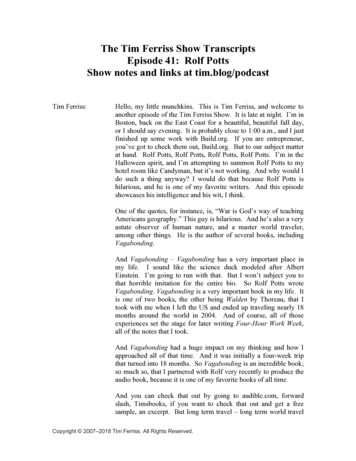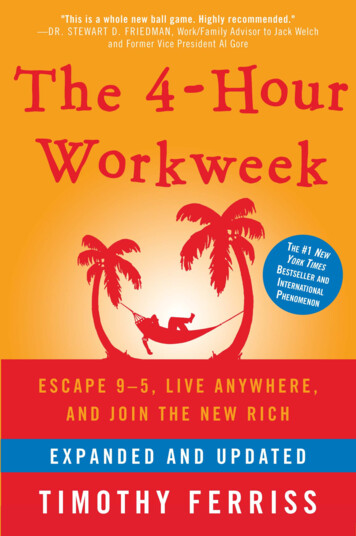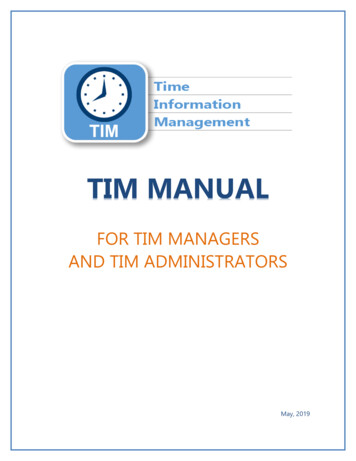
Transcription
The Tim Ferriss Show TranscriptsEpisode 41: Rolf PottsShow notes and links at tim.blog/podcastTim Ferriss:Hello, my little munchkins. This is Tim Ferriss, and welcome toanother episode of the Tim Ferriss Show. It is late at night. I’m inBoston, back on the East Coast for a beautiful, beautiful fall day,or I should say evening. It is probably close to 1:00 a.m., and I justfinished up some work with Build.org. If you are entrepreneur,you’ve got to check them out, Build.org. But to our subject matterat hand. Rolf Potts, Rolf Potts, Rolf Potts, Rolf Potts. I’m in theHalloween spirit, and I’m attempting to summon Rolf Potts to myhotel room like Candyman, but it’s not working. And why would Ido such a thing anyway? I would do that because Rolf Potts ishilarious, and he is one of my favorite writers. And this episodeshowcases his intelligence and his wit, I think.One of the quotes, for instance, is, “War is God’s way of teachingAmericans geography.” This guy is hilarious. And he’s also a veryastute observer of human nature, and a master world traveler,among other things. He is the author of several books, includingVagabonding.And Vagabonding – Vagabonding has a very important place inmy life. I sound like the science duck modeled after AlbertEinstein. I’m going to run with that. But I won’t subject you tothat horrible imitation for the entire bio. So Rolf Potts wroteVagabonding. Vagabonding is a very important book in my life. Itis one of two books, the other being Walden by Thoreau, that Itook with me when I left the US and ended up traveling nearly 18months around the world in 2004. And of course, all of thoseexperiences set the stage for later writing Four-Hour Work Week,all of the notes that I took.And Vagabonding had a huge impact on my thinking and how Iapproached all of that time. And it was initially a four-week tripthat turned into 18 months. So Vagabonding is an incredible book;so much so, that I partnered with Rolf very recently to produce theaudio book, because it is one of my favorite books of all time.And you can check that out by going to audible.com, forwardslash, Timsbooks, if you want to check that out and get a freesample, an excerpt. But long term travel – long term world travelCopyright 2007–2018 Tim Ferriss. All Rights Reserved.
does not have to be a wealthy person’s sport. And in thisconversation we talk about all sorts of things, ranging from how totravel, how Rolf travels, writes, wanders, gets lost, studies success,studies quitting success or managing success. And maybe youhaven’t thought that’s an important element of life planning, but itapparently is, I’ve come to believe.And I almost forgot of course, there are a ton of resources andlinks and websites, and books mentioned in this episode. All of itcan be found in one place, in the show notes, so you just have to goto fourhourworkweek.com, all spelled out, forward slash, podcast;fourhourworkweek.com, forward slash, podcast. You can find theshow notes and resources and links for this episode, as well asevery other episode like those for Peter Thiel, Tony Robbins, MikeShinoda, you name it. So you don’t need to scribble furiously,unless you want to, but fourhourworkweek.com, forward slashpodcast is where you want to go.And I had a blast with this interview. It is a two-part interview.This is going to be part one, and then there’s part two. And I reallyhope you enjoy it as much as I did. It was just fantastic fun. Sowithout further ado, please meet Rolf Potts.Tim Ferriss:Hello, ladies and gentlemen, this is Tim Ferriss, and welcome toanother episode of the Tim Ferriss Show. I am very excited forthis episode because I get to catch up with a good friend of mine,who didn’t start off as a good friend. And that is Rolf Potts. Rolf,thank you so much for making the time.Rolf Potts:It’s good to talk to you.Tim Ferriss:Yeah, and I realize by saying that you didn’t start off as a goodfriend, it makes it sound like we might have been arch enemies orsomething. But what I mean by that is I really felt like I got toknow you through your book Vagabonding, which was one of twobooks – many people do not know this – that I took with mearound the world for about a year and a half, starting in late 2004,early 2005. It must have been 2004. And it is one of my mostheavily underlined books, and really acted as my guide and mycompanion for all of the various travels, adventures, misadventuresduring that time. So first and foremost, thank you for writing sucha spectacular little tome.Rolf Potts:My pleasure. Thank you for reading. It occurs to me that I heardfrom you in late 2005, which was – in retrospect was pretty soonCopyright 2007–2018 Tim Ferriss. All Rights Reserved.
after I had written the book, so you must have found it pretty soonafter it came out.Tim Ferriss:Yeah, I found it soon after it came out because I suppose – and thismay be true for many people, the buying of the book, then thereading of the book, and then the implementing of the book hadquite a bit of lag time in between those various junctures. But Ithink like a lot of people, I was really – I spent a lot of timefantasizing about travel, and taking that leap, and but had more thehandful of nebulous fear about it.And I suppose we could start there actually, and I could ask verysimply what are some recommendations that you have for peoplewho may be able to work up the savings, if necessary, and arereally just fearful of taking the leap, and exploring long termtravel? And I suppose just wrapped into that you might give abrief description of Vagabonding itself, and the subtitle, and whyyou wrote it. But I’ll let you explore that multi-part question, ifyou wouldn’t mind.Rolf Potts:Yeah, well, I like that you bring up the idea of fantasizing abouttravel because I think it’s something that everybody does, and it’sone of those top three, if not top two or one things that peopledream about that. And you see it in the movies all the time. Andin fact, I mentioned this in Vagabonding. The Heist movie, wherethe whole goal is to have this complicated robbery, so they canhave enough money to move overseas to a wonderful place. Andas I say in the book is you don’t need to rob a bank to do that. Infact, you can do that for a cost that is equal to, and sometimes lessthan your cost of living in a major American city.And so I think an important principle I bring up in Vagabonding issaying don’t put this off. If you’re dreaming about travel, andmost people do – and if you don’t dream about travel, that’s fine,but I really address these travel dreams, which are so common –but don’t wait until you’re too old because retirement isn’tnecessarily the best time to do something like this.And in fact, Henry David Thoreau – I think Walden was the otherbook you took on your travels – talks about how people – and I’mnot quoting him directly – they put off what they really want to dountil they’re too old to actually do it. That’s a paraphrase. And soif you are 18, 28, 38, 48, whenever, you’re dreaming about travel,make your goals soon, and don’t put off those goals becausethey’re very attainable. And you know, I think there’s a lot offears that are tied into confronting vagabonding, which you askedCopyright 2007–2018 Tim Ferriss. All Rights Reserved.
me for the definition. Vagabonding is long term travel. It’s notjust a vacation. It’s not a week or two off that society gives you asa vacation.It’s six months or two years, or six weeks that you make foryourself to travel in earnest, not as a consumer experience, not as avacation, but as a more deeply meaningful life experience, and as away to actualize your wealth of time.And I think this is an idea we’ll come back to a lot, and it’ssomething that you write about, as well as me, is the idea of timewealth, the idea that you’re experiences are more valuable in lifethan the things that you accumulate, the things that are alwaysbeing touted as the most important things in life. So travel is agreat way to cash in on your time wealth. And vagabonding, justby definition, is a more meaningful way of travel. It’s a way ofslowing down, and really discovering parts of yourself, instead ofjust buying a lot of experiences, which we’ve sort of beenconditioned to do as American consumers. My first vagabondingtrip was 20 years ago this year, oddly enough.Tim Ferriss:Happy anniversary.Rolf Potts:Thank you, thank you. It was just this time that I was stragglingback to Kansas after having this amazing eight-month trip aroundNorth America. And it was a trip that I thought would be my last.I thought I would get travel out of my system so I could become aresponsible American workaholic, and then maybe return to travelwhen I was old.But you mentioned the idea of fear, and the fears I had going outwere is this going to be expensive, is this going to be dangerous,am I going to come back and be compromised professionally? Andall of those sort of turned into the opposite, that it was a lot saferthan I expected. It was a lot cheaper than I expected. And I cameback, and for 20 years, I’ve been integrating travel with aprofessional life that continues to diversify. I continue to do otherthings to make money, while at the same time having big swaths oftime to travel.And I’m not suggesting that everybody needs to become avagabonder for a 20-year chunk, and in some ways I travel a lotless than I used to 10 or 15 years ago. But it’s something that youcan do. It’s an option that you can have. And it’s not an optionthat you wait for life to give you; you create it. And so I’m a bigCopyright 2007–2018 Tim Ferriss. All Rights Reserved.
believer in the active aspect of vagabonding, of saving yourmoney.The lottery is another metaphor I use a lot in vagabonding thatpeople keep waiting for the lottery to reward them. But as we allknow, the odds that you’re going to win the lottery is pretty low.But we’ve already won the lottery. We were born with timewealth. And so it’s just a matter of creating these travelexperiences, or these time-rich experiences through things likesimplicity and just the decision to make these sort of thingshappen.Tim Ferriss:Well, that’s one of the themes and I think gifts that you provide inVagabonding. And for those perhaps wondering, the subtitle saysa lot, which is An Uncommon Guide to the Art of Long TermWorld Travel. And I think uncommon and art are both key wordsin that subtitle.You provide a portfolio – that sounds too financial – a quiver ofphilosophies and suggestions for simplification, viewing the worldthrough a different lens, really decluttering your life bothmaterially and emotionally and psychologically, even if you do nottravel. And what I’ve noticed is I recommend Vagabonding topeople who have no intention of traveling, or for whatever set ofcircumstances, feel they can’t travel, simply because – and I’mblanking on the attribution here – but I really believe that mostpeople, even those who have more money than they know what todo with, live lives of quiet desperation.And they have this – they’ve fallen into a drone-like schedule,where they have these material objects they thought might makethem happy, or give them something they were lackingbeforehand. But they’ve lost that – the excitement and anticipationperhaps that they once had, you know, the leaping into theunknown, the feeling that kids have the night before Christmas, orthe week before Christmas.And adults lose that. And I think one of the easiest ways tocapture that is to actually fantasize about travel, but do it in detail,right, so not one day I want to travel, but to read Vagabonding andgo, “Oh, my God, like I could do A, I could B. I could go to Japanfor the first time. I could go to Europe and busk. I could do all ofthese things that rekindle that passion and enthusiasm andexcitement, because I think that excitement is a much moretangible metric for perhaps what otherwise can be very nebulous inthe word successful, right.Copyright 2007–2018 Tim Ferriss. All Rights Reserved.
In the US, I think that for better or for worse, and I think perhapsfor both, we have this bit of Protestant like work ethic towards arelatively undefined goal, which is this success. And what aresome exercises, just in terms of helping to address that fear?You mentioned one thing, which would be setting a near timehorizon for travel, right. And I completely agree that the – inmany ways, the utility of travel decreases as your physical capacitydecreases, right, so you can do the most – you have the mostoptions the younger you are when you travel, or at least the morefunctional your body is when you travel. Aside from setting a tightgoal, and whether that’s a few weeks away, a few months away,what are some – are there any exercises that people can go throughto decrease that fear factor, and – or anything they can read besidesVagabonding to decrease that fear factor? There are stories, forinstance, that I’ll tell folks about – Columbia is a good example.I recently – not too long ago – spent a month in Medellin,Columbia, which is formerly the murder capital of the world, whenit was under the iron fist of Pablo Escabar, the drug kingpin. And Ifeel more threatened on Market Street in San Francisco, on a dailybasis, whenever I go and walk down certain portions of MarketStreet, than I ever felt in Medellin. And I went all throughout theentire city. And you know, I think that sometimes those stories canbe helpful. But do you have any recommendations for whether it’sexercises or things to read, to sort of overcome the fear of the big,bad overseas adventures, and all the terrible things that await youor not?Rolf Potts:Yeah, well, there’s a couple of big picture ones. It’s funny,Medellin, I was just there a year and a half ago. And I think nowit’s like the breast augmentation capital of the world.Tim Ferriss:Yeah, you know, South America, it’s like the – I guess Korea hasits facial bleaching, and then South America has – Brazil there isthe butt implant capital of the world, which is still incredible just toeven ponder, but yes, continue. Sorry to interrupt.Rolf Potts:Right. No, the drug lords moved out, and the plastic surgeonsmoved in. It’s a beautiful city, but it was a strange like physicalattribute that’s obviously surgeons have been hard at work –wonderful city. The advice that I have, there’s a couple of bigpicture ones – big picture advice that I have for this. And one is to– they’re both sort of mental. They’re about redefining yourrelationship, or just how you think about things.Copyright 2007–2018 Tim Ferriss. All Rights Reserved.
One is your relationship to money and what it represents, and oneis your relationship to information and what it represents. Youmentioned success, you know, the idea of – the AmericanPuritanical idea of what success is. And money is a great metricfor success, but it’s not the only metric for success. And I thinkpeople fixate on money to their own detriment. As I mentionedbefore, it doesn't take that much money to travel the world. Travelisn’t a consumer experience. And I think – you said you weren’tsure of the reference – I think you were quoting Thoreau when youwere sort of talking about these rich people who were sort ofbound by their own riches.And he’s actually stealing that from the Bible and the old Hinduscriptures, which talk about these golden chains with – underwhich we sink. We’re bound to our possessions. And throughsuccess – there’s a very old philosophical idea – through success,we lose perspective on the good life because we tie success soclosely with money and possessions and material splendor.And so if you can just redefine your relationship with what successis, and really it goes back to the idea of time wealth, that success isbeing able to do what you want whenever you want. And there’sbillionaires out there who are compromised in ways that you or I,or you know, your plumber or your local park ranger are notbecause just realizing that money is a tool – it’s not a metric forsuccess. It’s a nice side product of success, but it’s a tool forallowing you to live a time-rich, an experience-rich life, and reallylive in ways that allow you to not only follow, but discoverpassions that you never realized you had.Tim Ferriss:No, I agree on so many levels, and just to – because of course, weboth think about this stuff a lot and I apologize for jumping in. Butthe – just on the billionaire point, to give some concrete examples.So this is very recent. I was talking to a fellow. He is puttingtogether an event. It’s going to be 20 or 30 people, a number ofbillionaires in attendance. And it’s a weeklong retreat of sorts.And he said to me – this is a very – this actually, the gentlemanwho’s organizing it is very materially successful, but actually has avery level head on his shoulders and has been able to keep thingslike time and mobility in mind as important currencies and metricsfor his quality of life.So he’s done a really good job. But he said of course thebillionaires can’t take a week off, so they’re only going to be thereCopyright 2007–2018 Tim Ferriss. All Rights Reserved.
for 24 to 36 hours. And I thought about that, and it’s like thebillionaires can’t take a week off; what the hell is the point ofhaving their billion dollars if they can’t – if they don’t have theoptions – if they have fewer options than I do, if that makes sense.And it reminded me of a conversation I had at one point withanother person who shall remain unnamed, but he has at leastseveral hundred million dollars, maybe a billion-plus. And he wascommenting on the number of homes that he had, and he’s a goodguy. But in effect, his accumulation had gotten so out of control,he had between, I don’t know, six and twelve homes around theUS. And he said, “I no longer feel like people work for me. I feellike I work for them,” because he has staff of five to ten people ateach of these homes. He’s never at nine out of ten of them.And so he’s effectively just working to pay for homes where hisstaff basically are the owners of the homes because they live there.And it’s like wow, it really brings to mind – this is also a quote.Unfortunately, I don’t know the attribution, but the idea that thingsin excess become their opposite, right.So, you know, money that provides you with freedom basicallytakes away your freedom when it reaches a certain point. It startsto reduce your freedom; the idea that so-called freedom fighters inexcess, you know, given too much power become tyrants, right, sothings tend to flip when they get to a certain point of excess. Andalso, just because I’m such a die-hard fan boy of Vagabonding,correct me if I’m wrong, but the example that I think you gave inVagabonding of sort of Hollywood nonsense related to overseastravel was from Wall Street. Wasn’t it from Wall Street whereCharlie Sheen’s big goal was to save up enough money, you know,one day when he strikes it big, to get a motorcycle and drive acrossChina, I think.And you pointed out that you could scrub toilets in China – noteven in the US – for a month or two, and probably figure out a wayfinancially to make that possible. So certainly, I mean when I wastraveling, and ultimately putting together the notes andobservations that became The Four Hour Work Week, I saved tensof thousands of dollars compared to simply staying in the BayArea in California. Yeah, anyway.Rolf Potts:That’s the thing, is if you live in an expensive city like SanFrancisco, New York – there’s probably a half dozen otherexamples in the United States alone – you’re going to be living onfewer dollars per day by far if you’re traveling in Southeast Asia orCopyright 2007–2018 Tim Ferriss. All Rights Reserved.
South America or the Middle East, than you would just be payingyour bills and paying your rent and buying your groceries at home.You’re traveling in a completely different economic zone, whichwas sort of the point of pointing out this Wall Street example.In China, that movie was from the eighties. Certainly China ismore expensive since then. You might not have to clean toilets,you might have to clean something else now to ride yourmotorcycle across China. But the point is that all this importanceis placed upon conspicuous consumption or romantic ideas of whatwe can do. And oftentimes, it’s not money that’s in the way. It’s amindset thing, which is why I’m sort of answering your question your earlier question in a big picture way, that it’s really a mindsetabout your relationship to money, and your relationship toinformation, which I’ll get to in a second.But you were talking about you know, the billionaire who’s sort ofbecome a slave to his parasitical wealth. That’s an old idea, too. Ihave a quote from the ancient Sanskrit scriptures in Vagabonding,which is about the king and his palace only has half a bed and thefood on his plate for all the grain in his fields. Does he own therest?And at the end of the day, even the kings – and they knew this3000 years ago – even kings only eat one meal at a time. Theyonly sleep in one bed at a time. And at the end of the day, thesubstance of your life is through experience. And if you’resuddenly compromised, your material wealth and your money isthere to actualize your experience, and to enhance your lifemeaning. And the moment that it becomes parasitical, the momentthat you’re a billionaire who has 36 hours to go to a conference.And I’d love to know how much money is spent flying to theconference, catering it, because I know people who could travelprobably for five years on what one billionaire spends to go to the36-hour conference. And I’m sure you know people would coulddo the same.So that’s just such an important thing to keep in mind, is to – Ihave nothing against success or material success, but really knowwhere the line is, the point at which the success you’ve achieved isactually getting in the way of actualizing a good and meaningfuland option-filled life.Tim Ferriss:Definitely. Where does the information come in? I’m very curioushow the relationship to information plays into all this.Copyright 2007–2018 Tim Ferriss. All Rights Reserved.
Rolf Potts:Right. Well, this is where the fear factor comes in. You weretalking about Medellin, you know, there’s Mexico that has a lot ofdrug war violence going on. Of course the Middle East is aperennially – a bad reputation place to travel to. But keep in mindthat information is something that can work against you or workfor you. And these days, information is everywhere.When I left to travel the United States 20 years ago, I was actuallymore afraid of the United States in 1994 than I’m afraid of anyplace in 2014, simply because pre-worldwide web, I didn’t knowwhat to expect. I had no examples. I lived in Kansas, which is not– you know, in sort of bulls-eye middle class circles. I didn’t havea lot of friends traveling full time. And so I didn’t really haveanything to compare to.Now if you’re a successful person with the money to do it and thephysical capacity to do it, you can go online and not only can yourealize that people are traveling in Mexico, they’re traveling inColumbia, they’re traveling in Egypt and Israel and other parts ofthe world where you think that might be dangerous, you realizethat there’s family bloggers out there who are traveling with fivekids to these places, or traveling with a diabetes problem, or withphysical handicaps, or with money that they’ve made on a job thathas a fraction of what most people make, you know, people whohave simply decided to become wealthy in time, regardless of thefact that they work as park rangers or exotic dancers ormaintenance men.And so that information, you can – if you get past – I guess mediaexists in a man-bites-dog world. They’re going to talk aboutexplosions and revolutions and bad things around the world. Andso much of what we understand – in fact, there’s that famousphrase, you know, war is God’s way of teaching Americansgeography.Tim Ferriss:God, that’s so horrible and so true. Oh, God.Rolf Potts:And so because Americans are so insular, our internationalunderstanding is really pegged to major world events that don’treally represent day-to-day life in the towns of these towns aroundthe world. So if you can look past the panic-driven man-bites-dogtenor of media, and realize that Mexico is actually a giant country,and that the drug violence is very isolated, and that there are waysto travel in a very safe way, and a very inexpensive way, thensuddenly Mexico becomes this amazing and very close way totravel.Copyright 2007–2018 Tim Ferriss. All Rights Reserved.
My sister is a college professor in north central Kansas, and sheand her family took a little – there’s a big Mexican Americancommunity in Kansas, and they just took the local Mexicanminivan down to Fresnillo, Mexico, and just a family of four, andthey’ve traveled for next to nothing in an amazing way for theirteenage sons, to a part of the world that people assume is full ofdrug violence. And that was just taking a minivan from fiveblocks away from where they live. And so that information,realizing that the big picture news media information is alwaysgoing to be panic-driven.It’s always going to be man bites dog. And so the more you get tothe specific information and think, “Hmm, I’m 37 years old. I’mlooking to take a sabbatical from my job. I live in Virginia and Ilike to drink beer,” well, within 30 minutes, you can findsomebody who’s from a very similar life situation, who’s doingwhat you’re doing.And again, even if – I mean there’s people who are blind who aretraveling for years at a time. There are people with majorimpediments. And if you’re able-bodied, and you have a littlemoney socked away, there’s really nothing stopping you exceptyour own fear, which is sometimes tied to your ideas of money, oryour ideas of what the world is like, which is pegged toinformation.Tim Ferriss:Right, agreed. What type of sites or resources would yourecommend to people who are trying to find comparable folks,let’s just say, people who will help them alleviate their fear oftravel, or just in general, what type of online resources do yourecommend?Rolf Potts:Well, Google for one. I mean if you just Google 35 years old, twokids, one year of travel, then odds are you’ll find 20 blogs ofpeople in that demographic who are doing just that.So really be unabashed and very specific about Googling yourfears or your demographic, and just see who like you is outtraveling the world. There’s a lot of great traveler communities.I’ve been affiliated with bootsnall.com since the very beginning ofVagabonding. And part of their MO is just sort of creatingcommunity and support for people. And they have blogs andresources on their site. And there’s other travel communities aswell.Copyright 2007–2018 Tim Ferriss. All Rights Reserved.
Tim Ferriss:And you know, and BootsnAll has – we’ll put the links toeverything in the show, of course in the show notes for thosepeople listening. But it’s boots, the letter N, all.com.Rolf Potts:Yeah. B O O T S N A L L.com And they’ve been operating out ofPortland, Oregon for years, and have just quietly been doing very –the nice work of reassurance, and saying oh, so you’re worriedabout an around-the-world flight? Well, here’s how around-theworld flights look.You know, you’re worried about a certain situation? Here are someresources for that. And they’re not alone. I’m most familiar withthem because we’ve been – we’ve sort of shared a similar missionfor a long time. But there are big communities of travelers who arehappy to help and sort of help newbies feel better about theseprospects of long term travel.Tim Ferriss:Yeah, they’re all over. I remember one that was very helpful to mein the beginning was Virtualtourist.com, and that – I was with thesite for a long time, and then The Four Hour Work Week cameout, and I ended up becoming friends, much in the same way that Ireached out to you. I became friends with the founder of VirtualTourist, and so I’m now actually involved with a site of his calledTrippy, which is just trippy.com, as people would expect.But it’s effectively a community of open questions, and you canfollow specific locations, right, so if you’re interested in, whetherit’s San Francisco, Buenos Aires, Spain, Medellin, whatever, all ofthe questions that come up. For instance, I’m just taking a quicklook here. And you can pose any question you want. But what’sthe steepest place you’ve ever been in country X? Where is thebest rock climbing in San Francisco, which is generally going to beextremely inexpensive. What are the best online tools for groupvacation planning? So if you’re a family or multiple families, solike you said there are many different options.Speaking of technology, how have different services like – whetherit’s Couch Surfing, or even say, Airbnb, or anything else, really,these collaborative consumption companies changed travel foryou? And perhaps there are older examples, but you mentionedthat you’re taking a trip – before we started recording – and you’redoing a home swap. Would you mind perhaps elaborating on howsome of those options work, those that you’re familiar with,because I think that many people who consider travel, think interms of one of their main expenses being staying in a hotel, right.And I’d love for you to share any of your thoughts on that.Copyright 2007–2018 Tim Ferriss. All Rights Reserved.
Rolf Potts:Yeah, well, it’s shifted the way the travel world works, in someways that are delightfully convenient, and in some ways that are alittle bit strange. I think that technology is one of these doubleedged swords that in some ways has turned us into insufferablemicro-managers on the road.Tim Ferriss:Can you elaborate on that?Rolf Potts:Yeah, well, I’ll start with the negative. The travel culture, which Istarted in, which was 20 years ago, but really my moreinternational travels are more like 15 years ago. It’
show notes and resources and links for this episode, as well as every other episode like those for Peter Thiel, Tony Robbins, Mike Shinoda, you name it. So you don't need to scribble furiously, . this episode because I get to catch up with a good friend of mine, who didn't start off as a good friend. And that is Rolf Potts. Rolf,










